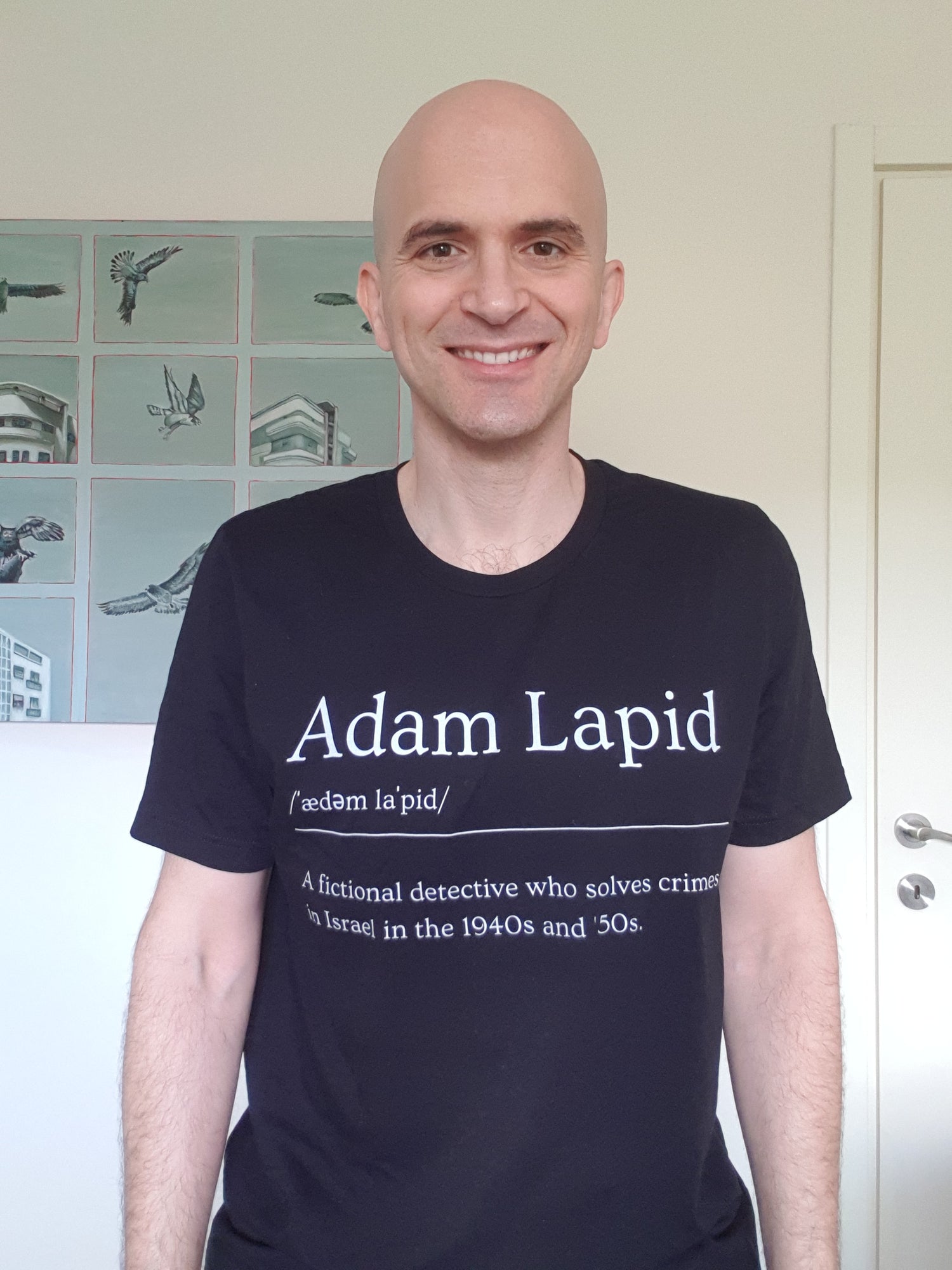Jonathan Dunsky
The Unlucky Woman (Adam Lapid Mysteries #5.5) - Ebook
The Unlucky Woman (Adam Lapid Mysteries #5.5) - Ebook
Couldn't load pickup availability
- Purchase the E-Book
- Receive Download Link via Email from BookFunnel
- Send to Preferred E-Reader and Enjoy!
Book Description:
She wants to know the truth. She may live to regret it.
Hilda Lipkind is sure her husband is cheating on her. So she hires private detective Adam Lapid to find out with whom.
Adam expects this to be a short, ordinary investigation.
Both he and his client are in for a surprise.
For what starts as a routine case soon turns out to be anything but.
To succeed in his mission, Adam must dig deep into both past and present, and cut through layers of lies and secrets.
And in the end, he must uncover a shocking truth that may do his client more harm than good.
Choose between Ebook and Audiobook formats.
Chapter 1 Look Inside
Chapter 1 Look Inside
Chapter 1:
She was a small woman, fair of complexion and dark of hair, with large brown eyes in which sadness and distress shone gloomily.
An hour earlier, while I was drinking coffee at Greta's Café, a boy of eight had come to my table with a letter from her.
"This is for you," he said with the seriousness of a man a score of years older. "I'm supposed to wait for your answer."
Inside the plain envelope was a note. On it, in a neat and careful hand, was written a short message:
Dear Mr. Lapid,
I have need of a detective. It is a matter of some urgency. I hope that you are free.
Unfortunately, I am unable to come to you. Will you be so kind as to drop by my apartment on Hanevi'im Street at your earliest convenience? Please give Dan your reply.
Thank you,
Hilda Lipkind
It was a balmy autumn day, and I had little to do, so I told Dan to tell Hilda Lipkind that I would be there within the hour. He nodded solemnly, recited the precise address, and hurried off to give her the news. I folded the note and put it in my pocket, finished my coffee and the chess game I'd been playing, and bid Greta goodbye. Then I walked uptown to Hanevi'im Street, where I located Hilda Lipkind's building, climbed the stairs to her third-floor apartment, and was shown to a chair in her modestly appointed living room. She reclined on a ratty old sofa.
Looking at her, I noticed things. Shadows under her eyes. Worry lines at the corners of her mouth. A slumped posture of despair and fatigue. A simple wedding band, which she kept fiddling with. And, of course, a prominent bulge in her abdomen.
Some women in her condition look radiant. She, on the other hand, gave the impression of a weakening light bulb flickering its last light before burning out.
One of those, I thought moodily, half wishing she had not sought me out. The kind of job she would likely offer me was not one that I liked. It was the sort of job that could bring my client nothing but further misery, along with a heart-wrenching truth. Still, I was in no position to decline job offers. They did not come that often, and I needed the money.
I supposed her pregnancy was what had prevented her from coming to see me, but I didn't ask.
"Thank you for coming, Mr. Lapid," Hilda Lipkind said. Her Hebrew was tinged with a distinct Silesian accent. She had grown up somewhere in the eastern parts of Germany, on land that was now either within the new borders of Poland or those of the German Democratic Republic, where not a hint of democracy could be found.
"It's no trouble, Mrs. Lipkind. What can I do for you?"
She hesitated. Some clients are like that. They know they're in trouble. They want my help. But a part of them clings to the belief that things are, in fact, not as bad as they seem, that if they just leave well enough alone, all will be well again. The moment they hire me, that belief turns to dust.
For some obscure reason—her being pregnant and so obviously distressed, perhaps—I decided to ease her into it. Gesturing at her stomach, I said, "When are you due?"
"In two months. December.”
"Congratulations."
"Thank you," she said, her tone as flat as a tombstone, as dead as what lay beneath one.
"Your first?"
A dark cloud swept over her anguished face. She placed both hands on her abdomen as though to protect the child within from some threat.
"Yes. I—" She paused, unsure whether to put her thoughts into words. Then she said, "Yes, this will be our first."
She did not smile when she said this, and her frown made it clear my question had brought with it a measure of pain.
"What are you hoping for? A boy or a girl?"
She gave a shrug of helplessness, hopelessness, of utter unhappiness.
Yes, I thought. Definitely one of those.
"And your husband? What does he want?"
Her eyes welled with tears, and she brought out a handkerchief and put it to good use.
"A girl. My husband says he wants a girl. Maybe that's true, but I can't tell for certain. Not anymore."
"Why is that?"
"Because these days I don't know when my husband is being truthful and when he isn't. And if he lies about some things, why not about others?"
Her logic was unimpeachable and the sort that could do her very little good.
A flush rose in her cheeks. "Perhaps I was wrong to ask you to come here. I feel bad simply doubting him, as though I'm tarnishing his name."
I remained silent, giving her the chance to ask me to leave. When she didn't, I said, "But you doubt him nonetheless."
She let out a sigh. "I'm afraid so. I try not to, but I can't convince myself that everything he tells me is the truth."
"What is it you think he's hiding?"
"Another woman, I suppose."
"You think he's having an affair? Why?"
"Every evening, after he comes home and the two of us have dinner together, he goes out and does not return until well past ten at night."
"How long has this been going on?"
"A week. A miserable week."
"Where does he go?"
"He says he has to work late, that there's this big project at work, and that if he finishes it quickly, he might get a promotion and a raise. He says we could use the extra money with a new baby on the way. But when I ask him what this project is, he says he can't talk about it yet, that it's confidential. He even went out last Friday. Who works on a Friday evening? Does this make sense to you?"
It did not, but I refrained from telling her that. "What does he do for a living?"
"He's a clerk. He works for the city."
"And he can't support a wife and a child on his salary?"
"Other people do, so why can't he? Sure, we have to make do with little, but everyone else manages. I told him that the third night he went out, begged him to stay with me, but he simply said he had to work. He wouldn't meet my eyes when he said this. He used to love spending the evening with me. Now I have to stay up late just to see him before I turn in."
"Does he have a telephone in his office?"
"Yes."
"Have you tried calling him during the evening when he claims to be working?"
She shook her head. "We don't have a telephone in the apartment. No one in the building does. In normal times, I would walk down to a nearby café and call from there, but these days, even that minor exertion is forbidden me."
Seeing my raised eyebrow, she explained, "You asked before if this was our first child, and I said that it was. But it's not the first time I've been pregnant. It's the fourth. I've had three miscarriages, Mr. Lapid. Two girls and a boy. So the doctor has ordered me to avoid any physical effort, to stay off my feet, and to rest as much as possible. This is why I couldn't come to see you, but had to send Dan with the letter."
"I see," I told her, reading on her face a clear preference to not be consoled over the loss of her three children. I could understand that. She must have gotten a surfeit of commiseration over the years, and I knew from experience how little good that usually did.
"You could ask a neighbor to call on your behalf, couldn't you?"
"I could, but that would invite questions. Suppose I'm wrong and my husband answered the call—what would the neighbor have said? And if he didn't, what would that prove? He might have been momentarily out of the office when the phone rang. The only way for me to prove he's lying is either to call several times—something which I would not ask any neighbor to do—or send someone to check on him. Either way, it would have become public knowledge that we were having problems. I would rather keep this matter private, Mr. Lapid."
I nodded, appreciating the delicacy of her predicament. She was unable to verify her husband's veracity on her own, and she dared not enlist a neighbor or acquaintance to do so on her behalf. And so she turned to me.
Again I wished she had never approached me. But now that she had, and after seeing the anguish etched on her face, I knew there was no escaping it. I would take on her assignment and see it through to its likely bitter end.
"So you want me to find out what your husband does and who he sees?"
Hilda Lipkind nodded, making an observable effort to maintain her composure. She still clutched the handkerchief in one hand, but her eyes were dry. She was a strong woman. Stronger than she looked. "I would like to know if my husband is having an affair, and if so, with whom."
--- End of Chapter 1 ---
How Do I Get My Book?
How Do I Get My Book?
After you order your ebook, you will get a download link by email.
You can read your ebook on any enabled device, including Kindle, Nook, Kobo, and on modern tablets and smartphones.
The Ebook is delivered by BookFunnel.
Editorial Reviews
Editorial Reviews



Hi, I'm Jonathan Dunsky
I love history and solving puzzles, so I decided to combine my two passions by writing historical mysteries.
My main body of work is the Adam Lapid series. The Adam Lapid novels are historical mysteries that take place in Israel in the 1940s and '50s.
The one exception is The Auschwitz Detective, a book that takes place in Auschwitz in 1944.
I hope you'll join Adam Lapid as he hunts for crafty killers on the dusty streets of Israel and war-torn Europe.
You can get books 1-8 in the series for 20% off here: 8 Books Bundle.
As usual, Jonathan Dunsky’s “The Unlucky Woman“ is well written, including vivid character and location descriptions. He includes a vocabulary of choice words that I appreciate. His detective (Adam Lapid) is smart, intuitive and also sometimes fallible. Every book adds to my knowledge of Israel’s history.
The plots are creative and very interesting; each story is just the right length. In the shorter story, “The Unlucky Woman,” there is empathy for Adam’s client and for the choices she makes.
As usual I enjoyed your characters and their situations. An unusual twist on the Holocaust story. How did he realize who the culprit was??? Very clever.

